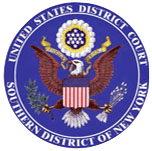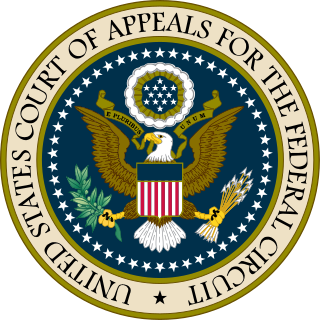Trade dress is a legal term of art that generally refers to characteristics of the visual appearance of a product or its packaging that signify the source of the product to consumers. Trade dress is a form of intellectual property.
In the context of the World Wide Web, deep linking is the use of a hyperlink that links to a specific, generally searchable or indexed, piece of web content on a website, rather than the website's home page. The URL contains all the information needed to point to a particular item, in this case the "Example" section of the English Wikipedia article entitled "Deep linking", as opposed to only the information needed to point to the highest-level home page of Wikipedia at https://www.wikipedia.org/.
Copyright misuse is an equitable defense against copyright infringement in the United States allowing copyright infringers to avoid infringement liability if the copyright holder has engaged in abusive or improper conduct in exploiting or enforcing the copyright. Copyright misuse is comparable to, and draws from precedents under, the older doctrine of patent misuse, which dates back to the early years of the 20th century and derives from the more general equity doctrine of "unclean hands", which bars a party from obtaining equitable relief against another when the party has acted improperly.
MGM Studios, Inc. v. Grokster, Ltd., 545 U.S. 913 (2005), is a United States Supreme Court decision in which the Court unanimously held that defendant peer-to-peer file sharing companies Grokster and Streamcast could be sued for inducing copyright infringement for acts taken in the course of marketing file sharing software. The plaintiffs were a consortium of 28 of the largest entertainment companies.
The multinational technology corporation Apple Inc. has been a participant in various legal proceedings and claims since it began operation and, like its competitors and peers, engages in litigation in its normal course of business for a variety of reasons. In particular, Apple is known for and promotes itself as actively and aggressively enforcing its intellectual property interests. From the 1980s to the present, Apple has been plaintiff or defendant in civil actions in the United States and other countries. Some of these actions have determined significant case law for the information technology industry and many have captured the attention of the public and media. Apple's litigation generally involves intellectual property disputes, but the company has also been a party in lawsuits that include antitrust claims, consumer actions, commercial unfair trade practice suits, defamation claims, and corporate espionage, among other matters.

Online Policy Group v. Diebold, Inc., 337 F. Supp. 2d 1195, was a lawsuit involving an archive of Diebold's internal company e-mails and Diebold's contested copyright claims over them. The Electronic Frontier Foundation and the Stanford Cyberlaw Clinic provided pro bono legal support for the non-profit ISP and the Swarthmore College students, respectively.

The Online Copyright Infringement Liability Limitation Act (OCILLA) is United States federal law that creates a conditional safe harbor for online service providers (OSP) and other Internet intermediaries by shielding them for their own acts of direct copyright infringement as well as shielding them from potential secondary liability for the infringing acts of others. OCILLA was passed as a part of the 1998 Digital Millennium Copyright Act (DMCA) and is sometimes referred to as the "Safe Harbor" provision or as "DMCA 512" because it added Section 512 to Title 17 of the United States Code. By exempting Internet intermediaries from copyright infringement liability provided they follow certain rules, OCILLA attempts to strike a balance between the competing interests of copyright owners and digital users.
In United States copyright law and jurisprudence established under the doctrine of stare decisis by the case of Netbula, LLC v. Symantec Corp., 516 F. Supp.2d 1137 and related cases. The cases defined the boundaries of property rights and contractual rights in the licensing of digital works. It is so called because the cases were decided by two renowned American judges and leading jurists, former U.S. District Judge Martin Jenkins and U.S. Magistrate Judge Elizabeth Laporte.

Perfect 10, Inc. v. Amazon.com, Inc., 508 F.3d 1146 was a case in the United States Court of Appeals for the Ninth Circuit involving Perfect 10, Inc., Amazon.com, Inc. and Google, Inc. The court held that Google's framing and hyperlinking as part of an image search engine constituted a fair use of Perfect 10's images because the use was highly transformative, overturning most of the district court's decision.
In copyright law, the legal status of hyperlinking and that of framing concern how courts address two different but related web technologies. In large part, the legal issues concern use of these technologies to create or facilitate public access to proprietary media content — such as portions of commercial Web sites. When hyperlinking and framing have the effect of distributing, and creating routes for the distribution of content (information) that does not come from the proprietors of the Web pages affected by these practices, the proprietors often seek the aid of courts to suppress the conduct, particularly when the effect of the conduct is to disrupt or circumvent the proprietors' mechanisms for receiving financial compensation.

Elektra Records Co. v. Gem Electronic Distributors, Inc., 360 F. Supp. 821, was an important case before the United States District Court for the Eastern District of New York that concerned copyright infringement, which held that secondary persons or entities could be liable for that tort under certain circumstances, and is also called the "'make-a-tape' case".
Section 230 of the Communications Decency Act of 1996 is a landmark piece of Internet legislation in the United States, codified at 47 U.S.C. § 230. Section 230(c)(1) provides immunity from liability for providers and users of an "interactive computer service" who publish information provided by third-party users:
No provider or user of an interactive computer service shall be treated as the publisher or speaker of any information provided by another information content provider.

Religious Technology Center v. Netcom On-Line Communication Services, Inc., 907 F. Supp. 1361, is a U.S. district court case about whether the operator of a computer bulletin board service ("BBS") and Internet access provider that allows that BBS to reach the Internet should be liable for copyright infringement committed by a subscriber of the BBS. The plaintiff Religious Technology Center ("RTC") argued that defendant Netcom was directly, contributorily, and vicariously liable for copyright infringement. Netcom moved for summary judgment, disputing RTC's claims and raising a First Amendment argument and a fair use defense. The district court of the Northern District of California concluded that RTC's claims of direct and vicarious infringement failed, but genuine issues of fact precluded summary judgment on contributory liability and fair use.

eBay v. Bidder's Edge, 100 F. Supp. 2d 1058, was a leading case applying the trespass to chattels doctrine to online activities. In 2000, eBay, an online auction company, successfully used the 'trespass to chattels' theory to obtain a preliminary injunction preventing Bidder's Edge, an auction data aggregator, from using a 'crawler' to gather data from eBay's website. The opinion was a leading case applying 'trespass to chattels' to online activities, although its analysis has been criticized in more recent jurisprudence.

Facebook, Inc. v. Power Ventures, Inc. is a lawsuit brought by Facebook in the United States District Court for the Northern District of California alleging that Power Ventures Inc., a third-party platform, collected user information from Facebook and displayed it on their own website. Facebook claimed violations of the CAN-SPAM Act, the Computer Fraud and Abuse Act ("CFAA"), and the California Comprehensive Computer Data Access and Fraud Act. According to Facebook, Power Ventures Inc. made copies of Facebook's website during the process of extracting user information. Facebook argued that this process causes both direct and indirect copyright infringement. In addition, Facebook alleged this process constitutes a violation of the Digital Millennium Copyright Act ("DMCA"). Finally, Facebook also asserted claims of both state and federal trademark infringement, as well as a claim under California's Unfair Competition Law ("UCL").

IO Group, Inc. v. Veoh Networks, Inc., 586 F. Supp. 2d 1132, is an American legal case involving an internet television network named Veoh that allowed users of its site to view streaming media of various adult entertainment producer IO Group's films. The United States District Court for the Northern District of California ruled that Veoh qualified for the safe harbors provided by the Digital Millennium Copyright Act (DMCA), 17 U.S.C. § 512 (2006). According to commentators, this case could foreshadow the resolution of Viacom v. YouTube.

1-800 CONTACTS v. WhenU.com was a legal dispute beginning in 2002 over pop-up advertisements. It was brought by 1-800 Contacts, an online distributor of various brands of contact lenses against WhenU SaveNow, a maker of advertising software. The suit also named Vision Direct, one of WhenU advertising customers, as a co-defendant. 1-800 CONTACTS alleged that the advertisements provided by WhenU, which advertised competitors of 1-800 CONTACTS when people viewed the company's web site, were "inherently deceptive" and that one of the advertisements "misleads users into falsely believing the pop-up advertisements supplied by WhenU.com are in actuality advertisements authorized by and originating with the underlying Web site".

Arista Records LLC v. Lime Group LLC, 715 F. Supp. 2d 481, is a United States district court case in which the Southern District of New York held that Lime Group LLC, the defendant, induced copyright infringement with its peer-to-peer file sharing software, LimeWire. The court issued a permanent injunction to shut it down. The lawsuit is a part of a larger campaign against piracy by the Recording Industry Association of America (RIAA).

Capitol Records, LLC v. ReDigi Inc., 934 F. Supp. 2d 640, is a case from the United States District Court for the Southern District of New York concerning copyright infringement of digital music. In ReDigi, record label Capitol Records claimed copyright infringement against ReDigi, a service that allows resale of digital music tracks originally purchased from the iTunes Store. Capitol Records' motion for a preliminary injunction against ReDigi was denied, and oral arguments were given on October 5, 2012.

Atari Games Corp. v. Nintendo of America Inc., 975 F.2d 832, is a United States Court of Appeals for the Federal Circuit case, in which the court held that Atari Games engaged in copyright infringement by copying Nintendo's lock-out system, the 10NES. The 10NES was designed to prevent Nintendo's video game console, the Nintendo Entertainment System (NES), from accepting unauthorized game cartridges. Atari, after unsuccessful attempts to reverse engineer the lock-out system, obtained an unauthorized copy of the source code from the Copyright Office and used it to create its 10NES replica, the Rabbit. The case involved copyright infringement claims by Nintendo and a defense based on fair use and copyright misuse by Atari.







